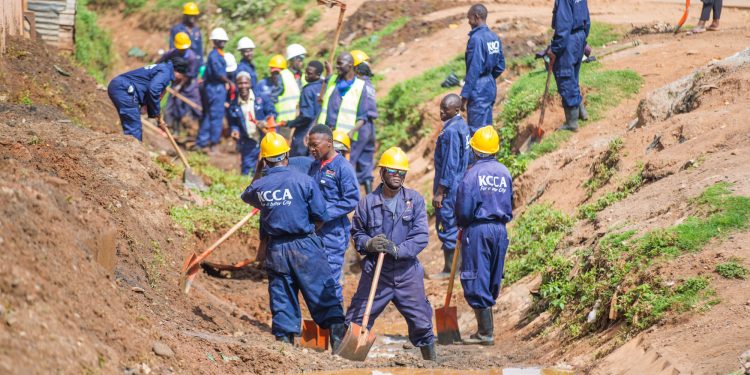KAMPALA For decades, Kampala has been a city under siege—its streets transformed into rivers, homes marooned, and businesses devastated with every downpour. But a groundbreaking resolution passed by the Kampala Capital City Authority (KCCA) Council on April 3, 2025, may finally end this cycle of destruction.
By authorizing competent local investors to develop, cover, and upgrade the city’s open drainage channels—under strict KCCA oversight—the council has unveiled a bold, long-term solution to Kampala’s chronic flooding crisis.
At the same meeting, the council also issued a scathing rebuke to Lord Mayor Erias Lukwago, whose baseless attacks on city developer Dr. Hajji Hamis Kiggundu and former Acting Executive Director Frank Nyakana Rusa may have dealt a fatal blow to his political credibility. Could this be the turning point Kampala has been waiting for?
Kampala’s Flooding Crisis: A City Drowning in Neglect
Kampala, Uganda’s bustling capital, has long been a paradox—a vibrant hub of culture and commerce, yet crippled by failing infrastructure. Since KCCA’s establishment in 2011, the authority has struggled to balance rapid urbanization with basic service delivery.
Of all the city’s challenges, flooding remains the most persistent. For over 40 years, open drainage channels have served as stormwater outlets—but poor waste management has turned them into clogged, disease-ridden hazards.
In March 2025, torrential rains submerged major areas like Clock Tower, Kawempe, Natete, Kamwokya, and the Northern Bypass. The root cause? Decades of neglect and an outdated drainage system no longer fit for a growing city.
The Game-Changer: A Resolution with Impact
The KCCA Council’s April 3 resolution marks a watershed moment. By allowing local investors to fund and execute drainage upgrades—under KCCA’s supervision—the city is moving from reactive cleanups to proactive infrastructure reform.
Stopping Waste Dumping at the Source
Open drainage channels have become garbage dumps, blocking water flow and triggering floods. Covering these drains and transitioning to modern underground systems will end this practice and ensure efficient stormwater flow year-round.
Vision of a Modern, Climate-Resilient Kampala
The council’s vision is clear: a Kampala with closed, efficient drainage systems that withstand urban pressures and climate change. This is the global standard—and one Kampala must adopt to evolve into a future-ready capital.
Nakivubo: Proof of Concept
This isn’t just theory—it’s already been tested. In November 2024, Dr. Hamis Kiggundu, under KCCA supervision, unclogged and rehabilitated the Jugula channel around Nakivubo as part of preparations for Nakivubo Stadium’s AFCON 2027 bid.
The result? While much of Kampala flooded during March rains, Nakivubo stayed dry. Residents and traders praised the project as the most effective drainage work they’d ever seen in the area.
Cleaner, Safer Urban Spaces
Open drains are more than a flooding risk—they’re health hazards and urban blights. Underground systems will clean up the city’s appearance, reduce disease, and improve safety for residents and visitors alike.
Sustainable Financing Through Local Partnerships
KCCA’s budget constraints and declining foreign aid have long stalled infrastructure upgrades. By leveraging private investment from local stakeholders, Kampala can close the funding gap while ensuring accountability and quality control through public-private collaboration.
Why the Government Must Act Now
This resolution isn’t just smart policy—it’s a national imperative. The flooding crisis has hampered economic growth, endangered lives, and undermined public trust for far too long.
Adopting this resolution means embracing homegrown solutions, aligning with global standards, and prioritizing real impact over rhetoric. Nakivubo proves it works—now the model must be scaled citywide.
Erias Lukwago’s Political Fallout
Amid the council’s progress came a sharp political reckoning. Lord Mayor Erias Lukwago—whose role is largely ceremonial—has long opposed Executive Directors and developers pushing modernization.
His latest attacks targeted Dr. Hamis Kiggundu and Frank Nyakana Rusa, falsely blaming them for citywide flooding allegedly caused by Nakivubo channel works. But on April 3, the council dismantled his claims.
Council members revealed that Kiggundu’s firm, Ham Enterprises (U) Ltd., received official KCCA project approval on December 9, 2024. Charges Lukwago cited were dismissed in January 2025 by a KCCA magistrate court. His accusations against Rusa, who was awarded for exemplary service, only highlighted his growing detachment from reality.
The council condemned Lukwago’s conduct as “unprofessional,” accusing him of abusing office and weaponizing misinformation to stall development. After more than a decade opposing reform, this very public embarrassment may spell the end of his political relevance.
A City on the Rise
The KCCA Council’s resolution signals a new chapter for Kampala. Empowering local investors to overhaul the drainage system isn’t just an infrastructure upgrade—it’s a shift in mindset. A move from blame to solutions, from decay to resilience.
The success at Nakivubo proves this approach works. Scaling it across Kampala can finally lift the city from the grip of seasonal destruction and put it on a path toward modernity and sustainability.
As Kampala steps into this new era, the contrast is stark: visionaries like Kiggundu and Rusa are forging progress, while Lukwago’s legacy fades under the weight of obstruction and political self-interest.
Kampala deserves better—and with this resolution, it’s finally on the path to getting it.





















